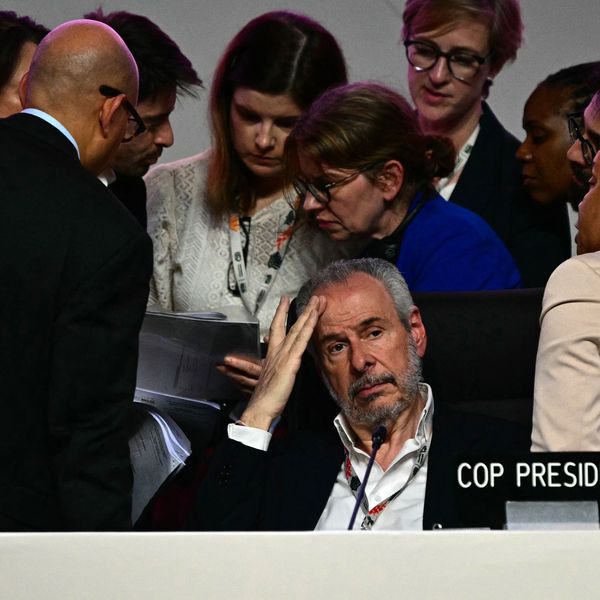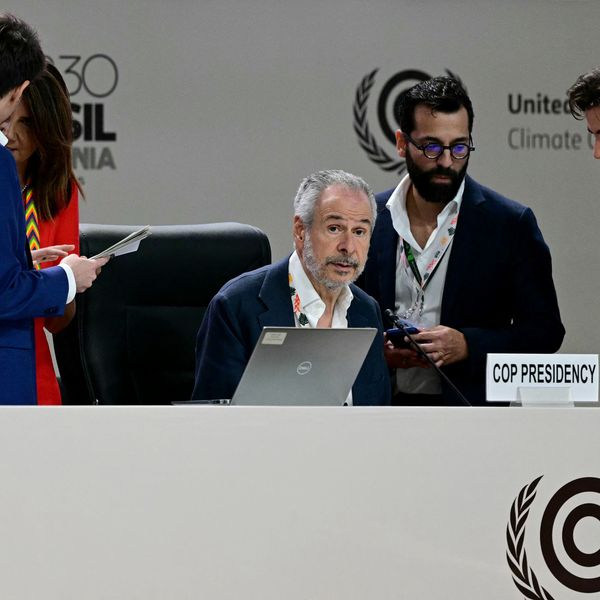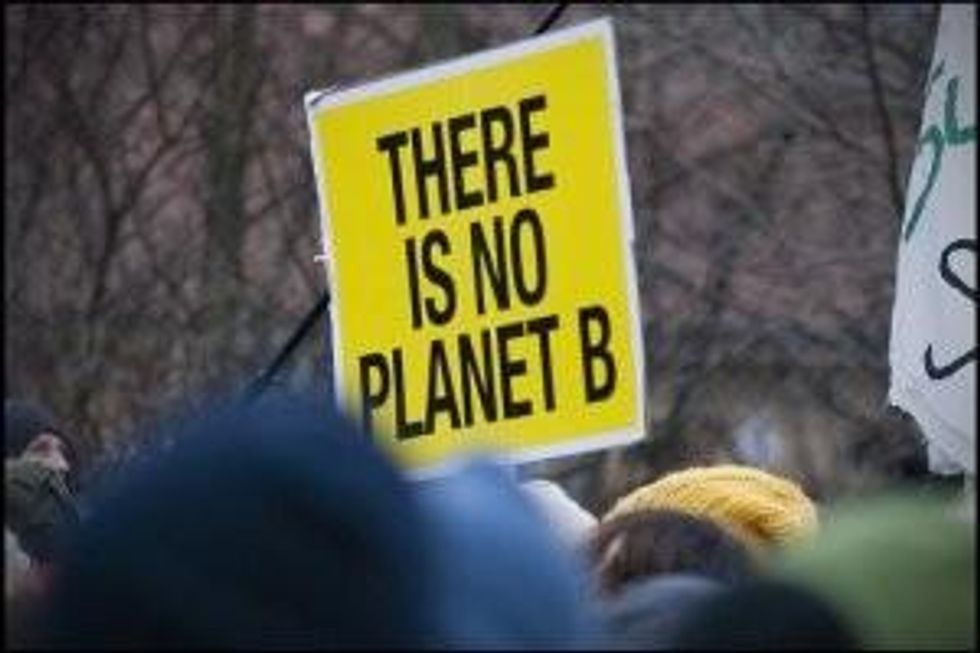Rich Nations 'Give Up' on New Climate Treaty Until 2020
Ahead of critical talks and despite pledge for new treaty by 2012, biggest economies privately admit likelihood of long delay
Governments of the world's richest countries have given up on forging a new treaty on climate change to take effect this decade, with potentially disastrous consequences for the environment through global warming.
Ahead of critical talks starting next week, most of the world's leading economies now privately admit that no new global climate agreement will be reached before 2016 at the earliest, and that even if it were negotiated by then, they would stipulate it could not come into force until 2020.
The eight-year delay is the worst contemplated by world governments during 20 years of tortuous negotiations on greenhouse gas emissions, and comes despite intensifying warnings from scientists and economists about the rapidly increasing dangers of putting off prompt action.
After the Copenhagen climate talks in 2009 ended amid scenes of chaos, governments pledged to try to sign a new treaty in 2012. The date is critical, because next year marks the expiry of the current provisions of the Kyoto protocol, the only legally binding international agreement to limit emissions.
The UK, European Union, Japan, US and other rich nations are all now united in opting to put off an agreement and the United Nations also appears to accept this.
Developing countries are furious, and the delay will be fiercely debated at the next round of international climate talks beginning a week on Monday in Durban, South Africa.
The Alliance of Small Island States, which represents some of the countries most at risk from global warming, called moves to delay a new treaty "reckless and irresponsible".
Postponing an operational agreement until 2020 would be fatal to hopes of avoiding catastrophic climate change, according to scientists, economists and green campaigners.
Fatih Birol, chief economist at the International Energy Agency (IEA), and one of the world's foremost authorities on climate economics, told the Guardian: "If we do not have an international agreement whose effect is put in place by 2017, then the door to [holding temperatures below 2C] will be closed forever."
Lord Stern, author of a landmark review of the economics of climate change, said aiming for a 2020 deadline was "pessimistic and risks introducing lethargy" to the process: "It's not fast enough - this is a collective failure, and [leaving agreement to] 2020 is taking considerable risks with the planet."
However, he said he was hopeful that countries and companies would continue to try to cut carbon in the absence of a deal in the short term.
Sir David King, former UK chief scientist, said: "[A date of 2020] for an agreement is absolutely to be expected, and I am not at all dismayed by that."
He believes individual countries and industries taking action even without a global deal provides the best chance of cutting emissions.
Scientists say the only way to avoid catastrophic and irreversible climate change is to hold temperatures to no more than 2C above pre-industrial levels.
The new delay comes as the Intergovernmental Panel on Climate Change warned on Friday of mounting evidence that global warming was leading to more extreme weather events such as floods and droughts, and fiercer storms.
Although the world's major economies made pledges to limit their emissions at the Copenhagen talks, there is little sign these are having an effect.
Last year, global carbon dioxide emissions from burning fossil fuels rose by more than 5% despite the worst recession for 80 years, according to the IEA.
Voluntary pledges by individual countries might never be enough to effect the massive changes needed. Birol said: "Our analysis shows [what happens] if you do not change investment patterns, which can only happen as a result of an international agreement."
Scientists warn that even if current pledges are met, they would not be enough to hold the global temperature rise to 2C, so more ambitious cuts are needed. Participants in the talks say there is little chance of that happening.
Connie Hedegaard, Europe's climate chief, said the EU's roadmap was to aim for an agreement to be drawn up "by the first COP [UN meeting] after 2015", which would be December 2016, and this could then come into force in 2020.
A Japanese official told the Guardian that Tokyo was aiming for an agreement to come into force in 2020, which was "realistic", though he later said Japan was aiming for agreement "as soon as possible". The UK's negotiators are now fixed on 2020, and the US is understood to expect a similar trajectory.
Christiana Figueres, the UN's top official on climate change, did not disagree with this roadmap. She said: "Making an agreement is not easy. What we are looking at is not an international environment agreement -- what we are looking at is nothing other than the biggest industrial and energy revolution that has ever been seen."
Ruth Davis of Greenpeace said: "Failing to agree a plan to tackle the climate crisis in Durban would be a disaster, but agreeing on a plan to do almost nothing for a decade would arguably be worse. Leaders in Durban must ... agree to sign a binding global deal no later than 2015, which will re-establish the link between climate science and the pace and scale of action. Otherwise we risk sliding rapidly from climate crisis to climate catastrophe."
An Urgent Message From Our Co-Founder
Dear Common Dreams reader, The U.S. is on a fast track to authoritarianism like nothing I've ever seen. Meanwhile, corporate news outlets are utterly capitulating to Trump, twisting their coverage to avoid drawing his ire while lining up to stuff cash in his pockets. That's why I believe that Common Dreams is doing the best and most consequential reporting that we've ever done. Our small but mighty team is a progressive reporting powerhouse, covering the news every day that the corporate media never will. Our mission has always been simple: To inform. To inspire. And to ignite change for the common good. Now here's the key piece that I want all our readers to understand: None of this would be possible without your financial support. That's not just some fundraising cliche. It's the absolute and literal truth. We don't accept corporate advertising and never will. We don't have a paywall because we don't think people should be blocked from critical news based on their ability to pay. Everything we do is funded by the donations of readers like you. Will you donate now to help power the nonprofit, independent reporting of Common Dreams? Thank you for being a vital member of our community. Together, we can keep independent journalism alive when it’s needed most. - Craig Brown, Co-founder |
Governments of the world's richest countries have given up on forging a new treaty on climate change to take effect this decade, with potentially disastrous consequences for the environment through global warming.
Ahead of critical talks starting next week, most of the world's leading economies now privately admit that no new global climate agreement will be reached before 2016 at the earliest, and that even if it were negotiated by then, they would stipulate it could not come into force until 2020.
The eight-year delay is the worst contemplated by world governments during 20 years of tortuous negotiations on greenhouse gas emissions, and comes despite intensifying warnings from scientists and economists about the rapidly increasing dangers of putting off prompt action.
After the Copenhagen climate talks in 2009 ended amid scenes of chaos, governments pledged to try to sign a new treaty in 2012. The date is critical, because next year marks the expiry of the current provisions of the Kyoto protocol, the only legally binding international agreement to limit emissions.
The UK, European Union, Japan, US and other rich nations are all now united in opting to put off an agreement and the United Nations also appears to accept this.
Developing countries are furious, and the delay will be fiercely debated at the next round of international climate talks beginning a week on Monday in Durban, South Africa.
The Alliance of Small Island States, which represents some of the countries most at risk from global warming, called moves to delay a new treaty "reckless and irresponsible".
Postponing an operational agreement until 2020 would be fatal to hopes of avoiding catastrophic climate change, according to scientists, economists and green campaigners.
Fatih Birol, chief economist at the International Energy Agency (IEA), and one of the world's foremost authorities on climate economics, told the Guardian: "If we do not have an international agreement whose effect is put in place by 2017, then the door to [holding temperatures below 2C] will be closed forever."
Lord Stern, author of a landmark review of the economics of climate change, said aiming for a 2020 deadline was "pessimistic and risks introducing lethargy" to the process: "It's not fast enough - this is a collective failure, and [leaving agreement to] 2020 is taking considerable risks with the planet."
However, he said he was hopeful that countries and companies would continue to try to cut carbon in the absence of a deal in the short term.
Sir David King, former UK chief scientist, said: "[A date of 2020] for an agreement is absolutely to be expected, and I am not at all dismayed by that."
He believes individual countries and industries taking action even without a global deal provides the best chance of cutting emissions.
Scientists say the only way to avoid catastrophic and irreversible climate change is to hold temperatures to no more than 2C above pre-industrial levels.
The new delay comes as the Intergovernmental Panel on Climate Change warned on Friday of mounting evidence that global warming was leading to more extreme weather events such as floods and droughts, and fiercer storms.
Although the world's major economies made pledges to limit their emissions at the Copenhagen talks, there is little sign these are having an effect.
Last year, global carbon dioxide emissions from burning fossil fuels rose by more than 5% despite the worst recession for 80 years, according to the IEA.
Voluntary pledges by individual countries might never be enough to effect the massive changes needed. Birol said: "Our analysis shows [what happens] if you do not change investment patterns, which can only happen as a result of an international agreement."
Scientists warn that even if current pledges are met, they would not be enough to hold the global temperature rise to 2C, so more ambitious cuts are needed. Participants in the talks say there is little chance of that happening.
Connie Hedegaard, Europe's climate chief, said the EU's roadmap was to aim for an agreement to be drawn up "by the first COP [UN meeting] after 2015", which would be December 2016, and this could then come into force in 2020.
A Japanese official told the Guardian that Tokyo was aiming for an agreement to come into force in 2020, which was "realistic", though he later said Japan was aiming for agreement "as soon as possible". The UK's negotiators are now fixed on 2020, and the US is understood to expect a similar trajectory.
Christiana Figueres, the UN's top official on climate change, did not disagree with this roadmap. She said: "Making an agreement is not easy. What we are looking at is not an international environment agreement -- what we are looking at is nothing other than the biggest industrial and energy revolution that has ever been seen."
Ruth Davis of Greenpeace said: "Failing to agree a plan to tackle the climate crisis in Durban would be a disaster, but agreeing on a plan to do almost nothing for a decade would arguably be worse. Leaders in Durban must ... agree to sign a binding global deal no later than 2015, which will re-establish the link between climate science and the pace and scale of action. Otherwise we risk sliding rapidly from climate crisis to climate catastrophe."
Governments of the world's richest countries have given up on forging a new treaty on climate change to take effect this decade, with potentially disastrous consequences for the environment through global warming.
Ahead of critical talks starting next week, most of the world's leading economies now privately admit that no new global climate agreement will be reached before 2016 at the earliest, and that even if it were negotiated by then, they would stipulate it could not come into force until 2020.
The eight-year delay is the worst contemplated by world governments during 20 years of tortuous negotiations on greenhouse gas emissions, and comes despite intensifying warnings from scientists and economists about the rapidly increasing dangers of putting off prompt action.
After the Copenhagen climate talks in 2009 ended amid scenes of chaos, governments pledged to try to sign a new treaty in 2012. The date is critical, because next year marks the expiry of the current provisions of the Kyoto protocol, the only legally binding international agreement to limit emissions.
The UK, European Union, Japan, US and other rich nations are all now united in opting to put off an agreement and the United Nations also appears to accept this.
Developing countries are furious, and the delay will be fiercely debated at the next round of international climate talks beginning a week on Monday in Durban, South Africa.
The Alliance of Small Island States, which represents some of the countries most at risk from global warming, called moves to delay a new treaty "reckless and irresponsible".
Postponing an operational agreement until 2020 would be fatal to hopes of avoiding catastrophic climate change, according to scientists, economists and green campaigners.
Fatih Birol, chief economist at the International Energy Agency (IEA), and one of the world's foremost authorities on climate economics, told the Guardian: "If we do not have an international agreement whose effect is put in place by 2017, then the door to [holding temperatures below 2C] will be closed forever."
Lord Stern, author of a landmark review of the economics of climate change, said aiming for a 2020 deadline was "pessimistic and risks introducing lethargy" to the process: "It's not fast enough - this is a collective failure, and [leaving agreement to] 2020 is taking considerable risks with the planet."
However, he said he was hopeful that countries and companies would continue to try to cut carbon in the absence of a deal in the short term.
Sir David King, former UK chief scientist, said: "[A date of 2020] for an agreement is absolutely to be expected, and I am not at all dismayed by that."
He believes individual countries and industries taking action even without a global deal provides the best chance of cutting emissions.
Scientists say the only way to avoid catastrophic and irreversible climate change is to hold temperatures to no more than 2C above pre-industrial levels.
The new delay comes as the Intergovernmental Panel on Climate Change warned on Friday of mounting evidence that global warming was leading to more extreme weather events such as floods and droughts, and fiercer storms.
Although the world's major economies made pledges to limit their emissions at the Copenhagen talks, there is little sign these are having an effect.
Last year, global carbon dioxide emissions from burning fossil fuels rose by more than 5% despite the worst recession for 80 years, according to the IEA.
Voluntary pledges by individual countries might never be enough to effect the massive changes needed. Birol said: "Our analysis shows [what happens] if you do not change investment patterns, which can only happen as a result of an international agreement."
Scientists warn that even if current pledges are met, they would not be enough to hold the global temperature rise to 2C, so more ambitious cuts are needed. Participants in the talks say there is little chance of that happening.
Connie Hedegaard, Europe's climate chief, said the EU's roadmap was to aim for an agreement to be drawn up "by the first COP [UN meeting] after 2015", which would be December 2016, and this could then come into force in 2020.
A Japanese official told the Guardian that Tokyo was aiming for an agreement to come into force in 2020, which was "realistic", though he later said Japan was aiming for agreement "as soon as possible". The UK's negotiators are now fixed on 2020, and the US is understood to expect a similar trajectory.
Christiana Figueres, the UN's top official on climate change, did not disagree with this roadmap. She said: "Making an agreement is not easy. What we are looking at is not an international environment agreement -- what we are looking at is nothing other than the biggest industrial and energy revolution that has ever been seen."
Ruth Davis of Greenpeace said: "Failing to agree a plan to tackle the climate crisis in Durban would be a disaster, but agreeing on a plan to do almost nothing for a decade would arguably be worse. Leaders in Durban must ... agree to sign a binding global deal no later than 2015, which will re-establish the link between climate science and the pace and scale of action. Otherwise we risk sliding rapidly from climate crisis to climate catastrophe."


